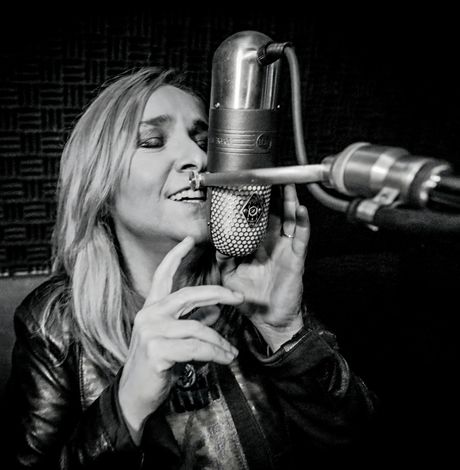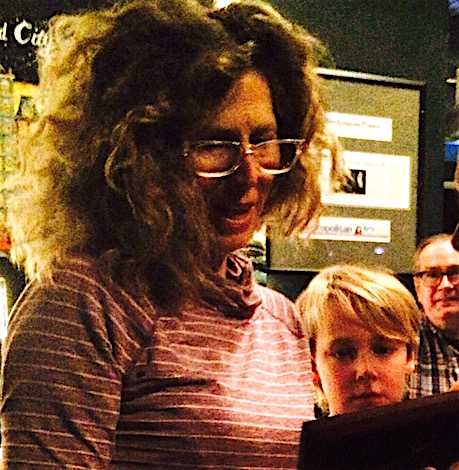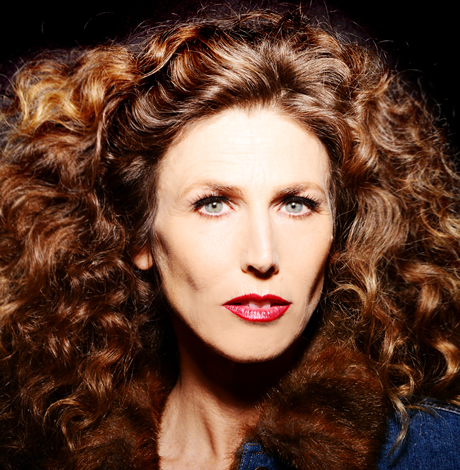Arts & Entertainment
Sophie’s choice
‘90s hitmaker returns after seven years with new album
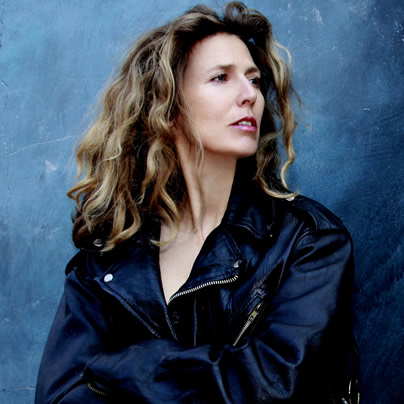
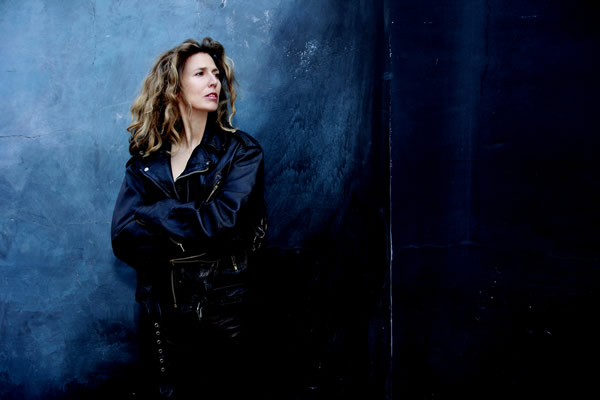
Sophie B. Hawkins released her first studio album in seven years last week. (Photos courtesy Trumpet Swan Entertainment)
How hard is it in this day and age to bounce back from a pop music career misstep? One likes to think pop culture — America ultimately voting with its pocketbook of course — eventually rewards and rediscovers the deserving.
One thinks of Kelly Clarkson who managed a comeback after the ill-advised downer (though it still went Platinum) 2007 album “My December.” And love her or hate her, Mariah Carey beat the odds with the monster-selling “Emancipation of Mimi” after her epic “Glitter” failure (both film and soundtrack).
But what if your supposed misstep isn’t even a bad album? Sophie B. Hawkins was well on her way to establishing distinguished career by the end of the ‘90s. She was red hot right out of the gate — “Damn I Wish I Was Your Lover,” which hit No. 5 on the Billboard Hot 100 in 1992, is a defining song of the era. She was nominated for the Best New Artist Grammy that year (co-nominated with Billy Ray Cyrus, Kriss Kross and Jon Secada; Arrested Development won). She survived the sophomore jinx with another mammoth hit “As I Lay Me Down,” a VH-1 staple from her second album “Whaler” that peaked at No. 6 during a 44-week run on the Hot 100 and a whopping 67 weeks (six at No. 1) on the AC chart. Unless you were in a convent that year, you heard it many, many times.
With that kind of start, the sky was conceivably the limit and expectations ran extremely high for her 1999 follow-up, “Timbre.” But trouble loomed — it’s a famous story, actually: Hawkins’ then label (Sony) only reluctantly released first single “Lose Your Way” with a banjo accompaniment. They argued it was poison for pop radio. Hawkins said it was essential. Though re-released independently in 2001 and followed by an indie follow-up called “Wilderness” in 2004, Hawkins lost her commercial, but not her artistic, footing. “Wilderness” turned out to be an unfortunately apt title — she spent years wandering.
Perhaps this wasn’t a total surprise, though. Anybody who’d paid attention knew Hawkins had a wild streak. She shimmied and writhed like a woman possessed on her duet with Melissa Etheridge on the latter’s VH-1 special in 1995 with a slate of then-hot female singer/songwriters like Joan Osborne, Jewel and Paula Cole. Those who caught Hawkins in concert knew of her penchant for the unconventional. As her audiences got smaller, her jeans got more shredded, her stream-of-consciousness stage meanderings more fluid. She wrangled memorably with Howard Stern about why she doesn’t shave her legs.
Though she’s long shunned labels for sexual orientation, the fact that she’s been in a same-sex relationship with filmmaker Gigi Gaston for several years (Gaston’s “The Cream Will Rise” follows Hawkins on an early tour) is one of the more conventional aspects of her persona. And it’s easy to forget that her wildly eclectic albums are full of intricately crafted and sometimes epic, sometimes disarming power pop that at times rivals Joni Mitchell’s best stuff for complexity and lyrical depth — check out “Mysteries We Understand,” “Only Love” “Help Me Breathe” and “I Need Nothing Else” especially.
Her hit singles are only part of the story. An early MusicHound review said, “Dig (further) than (the hits) and her abilities to seamlessly weave in and out of jazz, folk and dance, all driven by a kind of tribal percussion sensibility (emerge).”
But Hawkins, now 44, is starting to sound her age. Not vocally — her singing still has the luster that struck her chart gold all those years ago, but her insights during an hour-long phone chat last week show a woman who’s thought long and hard about life, pop culture popularity cycles, music making in the Internet age and much more. With no apparent time constraints, Hawkins gamely goes anywhere the questions take her and beyond, from hair tips and why she’s a dog person to the deeper story behind the banjo battles and her still-complicated relationship with her mother (explored memorably in “Cream”). The impetus for all this is her interminably delayed new album “The Crossing,” her first collection of new material in seven years, which dropped last week.
“People were always telling me, ‘Oh, you sold out with ‘Tongues and Tales,’ or, ‘Oh, you sold out with ‘Whaler.’ I’m not saying ‘Tongues and Tales’ was just art for art’s sake, but that was really the best I could to try and reach people,” Hawkins says. “Those albums were the least weird I could possibly be. You want your music to reach people, you want it to get out there to as many as possible, otherwise it’s too isolating. It’s like masturbation, you’re not doing it with anybody.”
Hawkins considers herself part of a group of ‘90s women singer/songwriters — she mentions Paula Cole and Tori Amos as peers — who barely “squeezed through” the music industry gate before the doors shut altogether, from the advent of file sharing to endless label buyouts that left precious few major players in the game. Yes, there are still women hitmakers — Rihanna, Adele — but they’re few and far between and getting younger all the time.
“I think everybody knew what was going to happen, the chilly winds were already blowing,” she says. “I felt with the first album like, ‘Wow, I really got away with something’ in spite of all this. Then with ‘Whaler’ it felt like that again, although that was really the beginning of the fight. … In the ‘90s, it really started turning against the individual artist into this totally corporate thing in every way. It was like, ‘Oh, I’m with this group, I’m with that group, this is Sophie’s sound, this is the lesbian sound, the country artist, the right wing, the left wing — I feel like several of us just barely squeaked through in spite of all that.”
And yes, some of that line of thinking is what’s led Hawkins to shun traditional LGBT labels.
She admits she and Gaston have been in an exclusive relationship (Gaston is also her manager), but says a lack of general perception of nuance causes her to avoid certain language.
“It’s because nobody listens,” Hawkins says. “They just want to say it, and shut up and not hear any more about it. I love the word bisexual but it has such a negative connotation, I don’t know why. It’s like this big, scary thing for people so I’ve tried to come up with something that’s what I really think I am … I’m definitely not heterosexual or homosexual, I love men and women equally and passionately. I’m just having a relationship right now with a woman and I think there are very few men I could have a relationship with. I’m a very singular person. I’m committed to this woman, but if I were not, I’d probably be alone.”
The years since “Wilderness” have not been inactive for Hawkins. She became a mother — her son with Gaston, Dashiell, is 3. She popped up at the Grammys pre-show as a presenter, campaigned avidly for Hillary Clinton’s presidential campaign, released several singles along the way including one (“The Land, the Sea and the Sky”) as a benefit for the Waterkeeper Alliance, an environmental group.
She released a live album and her song “Life is a Bomb” was on the soundtrack for the 2011 Garry Marshall film “New Year’s Eve,” a feat Hawkins says was wildly against the odds. She also tweaked “The Crossing” endlessly as the years went by and various proposed release dates came and went. Hawkins says it’s “a miracle” the album came out at all.
She also worked with Gaston on a musical for Kristin Chenoweth that’s on hold until Chenoweth’s producer of choice is available and she has high hopes for an October musical in Los Angeles (Hawkins lives in Venice, Calif., and has been on the West Coast for more than a decade) in which she’ll star as Janis Joplin.
Hawkins says she knew instinctively, she was supposed to do the Joplin piece.
“My reaction was just, ‘Yes,’ and I never say yes to anything right away. I just think there’s something I can do with Janis that will speak to every creative person out there who feels overlooked or treated in a way that’s not fair. … If we can get this ball in the basket, I have a good feeling about this, I think it could be a slam dunk. It will be so relevant to now, it really gives me a freedom I cannot even tell you.”
Hawkins guesses, counting the Chenoweth musical and “The Crossing” material, she’s written about 300 songs in the last seven years. The album will include acoustic remakes of “Damn” and “As I Lay Me Down.” Hawkins has a distribution deal with EMI for the release.
Hawkins says she’s a huge dog lover because she could never have one as a kid. She loves them because there’s “no barrier” to their affection and presence.
Of her trademark abundant tresses, Hawkins says her only hair care tip is to avoid washing it as much as possible. She insists hers looks best when it’s been weeks since the last shampoo.
“That’s when I always get the most compliments, people saying ‘Oh, you have such great hair.’”
She’s also realistic about “The Crossings” commercial prospects. She says she’ll never stoop to giving her music away but realizes the chances of duplicating her early chart success are practically nil.
On one hand, Hawkins says her art (she paints too) is something she “couldn’t not do.” Conversely, she says it’s Gaston who has urged her to continue against increasingly difficult industry and commercial odds.
“She’s so much more than a manager,” Hawkins says. “Things bother her more than they bother me. Oh, believe me, I would have just gone away by now and written and painted by myself if it weren’t for her. I don’t think I could have survived but she tells me, ‘You’re not giving up, you’re a great artist, it kills me that people don’t see this.’ She really takes it on as one of her missions.”
So in hindsight, was the banjo battle worth it?
Hawkins says the story has gotten oversimplified as a kind of cautionary tale for supposedly overambitious pop singers — as in, “Remember Sophie B. Hawkins? Look what happened to her.”
She says it was more an issue of increasing pressure to write songs in huge groups of collaboration Hawkins found unwieldy and artistically stifling. She says she would have agreed to remove the banjo line for the radio version and kept it on a remix or B-side version (“Believe me, all those scenarios were discussed”), but push came to shove when label execs put their foot down over her using it for a live TV appearance.
“It was really the straw that broke the camel’s back,” she says. “It was such a clear thing to me. They were taking away my horse, in a way. I thought, ‘I can’t ride into battle without my horse. I can’t win without the horse.’ It just made me realize we weren’t on the same team anymore. … They were no longer rooting for me to win, they were trying to destroy me.”
Hawkins says she’s learned to find rewards in non-traditional places. Even though her relationship with her mother is still every bit as complicated as it was portrayed in “Cream,” Hawkins says there are sparks of healing and inspiration there too.
“There are artistic people out there struggling who never make at all,” she says. “So when somebody tells me they get it, it’s like winning an Oscar. My mother called me the other day and told me she’d listened to the new album. She said she’d felt it, whatever it was, this profound thing in the music. If your parents are alive and you get that, that’s my Grammy.”
Photos
PHOTOS: Montgomery County Pride in the Plaza
LGBTQ celebration held in downtown Silver Spring

Montgomery County Pride in the Plaza was held on Sunday, June 29 at Veterans Plaza in Silver Spring, Md.
(Washington Blade photos by Michael Key)























The fifth annual Fredericksburg Pride march and festival was held on Saturday, June 28. A march through the streets of downtown Fredericksburg, Va. was followed by a festival at Riverfront Park.
(Washington Blade photos by Michael Key)



















India
Anaya Bangar challenges ban on trans women in female cricket teams
Former Indian cricketer Sanjay Bangar’s daughter has received support

Anaya Bangar, the daughter of former Indian cricketer Sanjay Bangar, has partnered with the Manchester Metropolitan University Institute of Sport in the U.K. to assess her physiological profile following her gender-affirming surgery and undergoing hormone replacement therapy.
From January to March 2025, the 23-year-old underwent an eight-week research project that measured her glucose levels, oxygen uptake, muscle mass, strength, and endurance after extensive training.
The results, shared via Instagram, revealed her metrics align with those of cisgender female athletes, positioning her as eligible for women’s cricket under current scientific standards. Bangar’s findings challenge the International Cricket Council’s 2023 ban on transgender athletes in women’s cricket, prompting her to call for a science-based dialogue with the Board of Control for Cricket in India and the ICC to reform policies for trans inclusion.
“I am talking with scientific evidence in my hand,” Bangar said in an interview posted to her Instagram page. “So, I hope, this makes an impact and I will be hoping to BCCI and ICC talking with me and discussing this further.”
On Nov. 21, 2023, the ICC enacted a controversial policy barring trans women from international women’s cricket. Finalized after a board meeting in Ahmedabad, India, the regulation prohibits any trans player who has experienced male puberty from competing, irrespective of gender-affirming surgery or hormone therapy. Developed through a 9-month consultation led by the ICC’s Medical Advisory Committee, the rule aims to safeguard the “integrity, safety, and fairness” of women’s cricket but has drawn criticism for excluding athletes like Canada’s Danielle McGahey, the first trans woman to play internationally. The policy, which allows domestic boards to set their own rules, is slated for review by November 2025.
Bangar shared a document on social media verifying her participation in a physiological study at the Manchester Metropolitan University Institute of Sport, conducted from Jan. 20 to March 3, 2025, focused on cricket performance. The report confirmed that her vital metrics — including hemoglobin, blood glucose, peak power, and mean power — aligned with those of cisgender female athletes. Initially, her fasting blood glucose measured 6.1 mmol/L, slightly above the typical non-diabetic range of 4.0–5.9 mmol/L, but subsequent tests showed it normalized, reinforcing the study’s findings that her physical profile meets female athletic standards.
“I am submitting this to the BCCI and ICC, with full transparency and hope,” said Bangar. “My only intention is to start a conversation based on facts not fear. To build space, not divide it.”
In a letter to the BCCI and the ICC, Bangar emphasized her test results from the Manchester Metropolitan University study. She explained that the research aimed to assess how hormone therapy had influenced her strength, stamina, hemoglobin, glucose levels, and overall performance, benchmarked directly against cisgender female athletic standards.
Bangar’s letter to the BCCI and the ICC clarified the Manchester study was not intended as a political statement but as a catalyst for a science-driven dialogue on fairness and inclusion in cricket. She emphasized the importance of prioritizing empirical data over assumptions to shape equitable policies for trans athletes in the sport.
Bangar urged the BCCI, the world’s most influential cricket authority, to initiate a formal dialogue on trans women’s inclusion in women’s cricket, rooted in medical science, performance metrics, and ethical fairness. She called for the exploration of eligibility pathways based on sport-specific criteria, such as hemoglobin thresholds, testosterone suppression timelines, and standardized performance testing. Additionally, she advocated for collaboration with experts, athletes, and legal advisors to develop policies that balance inclusivity with competitive integrity.
“I am releasing my report and story publicly not for sympathy, but for truth. Because inclusion does not mean ignoring fairness, it means measuring it, transparently and responsibly,” said Bangar in a letter to the BCCI. “I would deeply appreciate the opportunity to meet with you or a representative of the BCCI or ICC to present my findings, discuss possible policy pathways, and work towards a future where every athlete is evaluated based on real data, not outdated perceptions.”
Before her transition, Bangar competed for Islam Gymkhana in Mumbai and Hinckley Cricket Club in the U.K., showcasing her talent in domestic cricket circuits. Her father, Sanjay Bangar, was a dependable all-rounder for the Indian national cricket team from 2001 to 2004, playing 12 test matches and 15 One Day Internationals. He later served as a batting coach for the Indian team from 2014 to 2019, contributing to its strategic development.
Cricket in India is a cultural phenomenon, commanding a fanbase of more than 1 billion, with more than 80 percent of global cricket viewership originating from the country.
The International Cricket Council, the sport’s governing body, oversees 12 full member nations and more than 90 associate members, with the U.S. recently gaining associate member status in 2019 and co-hosting the 2024 ICC Men’s T20 World Cup. The BCCI generated approximately $2.25 billion in revenue in the 2023–24 financial year, primarily from the Indian Premier League, bilateral series, and ICC revenue sharing. The ICC earns over $3 billion from media rights in India alone for the 2024–27 cycle, contributing nearly 90 percent of its global media rights revenue, with the BCCI receiving 38.5 percent of the ICC’s annual earnings, approximately $231 million per year.
Women’s cricket in India enjoys a growing fanbase, with over 300 million viewers for the Women’s Premier League in 2024, making it a significant driver of the sport’s global popularity. The International Cricket Council oversees women’s cricket in 12 full member nations and over 90 associate members, with the U.S. fielding a women’s team since gaining associate status in 2019 and competing in ICC events like the 2024 Women’s T20 World Cup qualifiers. The BCCI invests heavily in women’s cricket, allocating approximately $60 million annually to the WPL and domestic programs in 2024–25, while contributing to the ICC’s $20 million budget for women’s cricket development globally. India’s media market for women’s cricket, including WPL broadcasting rights, generated $120 million in 2024, accounting for over 50 percent of the ICC’s women’s cricket media revenue.
“As a woman, I feel when someone says that they are women, then they are, be trans or cis. A trans woman is definitely the same as a cis woman emotionally and in vitals, and specially, when someone is on hormone replacement therapy. Stopping Anaya Bangar from playing is discrimination and violation of her rights. It is really sad and painful that every trans woman need to fight and prove their identity everywhere,” said Indrani Chakraborty, an LGBTQ rights activist and a mother of a trans woman. “If ICC and BCCI is stopping her from playing for being transgender, then I will say this to be their lack of awareness and of course the social mindsets which deny acceptance.”
Chakraborty told the Blade that Bangar is an asset, no matter what. She said that the women’s cricket team will only benefit by participation, but the discriminating policies are the hindrance.
“Actually the transgender community face such discrimination in every sphere. In spite of being potent, they face rejection. This is highly inhuman. These attitudes is regressive and will never let to prosper. Are we really in 2025?,” said Chakraborty. “We, our mindset and the society are the issues. We, as a whole, need to get aware and have to come together for getting justice for Anaya. If today, we remain silent, the entire community will be oppressed. Proper knowledge of gender issues need to be understood.”
The BCCI and the International Cricket Council have not responded to the Blade’s repeated requests for comment.

